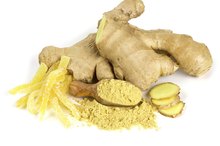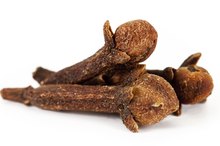What does fact checked mean?
At Healthfully, we strive to deliver objective content that is accurate and up-to-date. Our team periodically reviews articles in order to ensure content quality. The sources cited below consist of evidence from peer-reviewed journals, prominent medical organizations, academic associations, and government data.
- "Journal of International Pharmacology"; Ginger Prevents Th2-mediated Immune Responses in a Mouse Model of Airway Inflammation; ML.Ahui et al; December, 2008
- "Journal of International Pharmacology"; Ginger Prevents Th2-mediated Immune Responses in a Mouse Model of Airway Inflammation; ML.Ahui et al; December, 2008
The information contained on this site is for informational purposes only, and should not be used as a substitute for the advice of a professional health care provider. Please check with the appropriate physician regarding health questions and concerns. Although we strive to deliver accurate and up-to-date information, no guarantee to that effect is made.
Ginger Root for the Lungs
Ginger is an ancient Chinese herb with a 2500-year-old reputation as an herbal remedy 2. This versatile herb is also used in cooking. There are many health benefits of eating ginger. The basic form of this herb is the dried root. It contains many natural chemicals that help the lungs function more effectively. If you want to use ginger to promote your lung's health, you should first consult your doctor.
Detoxification
Ginger promotes your respiratory health by eliminating air pollutants, tobacco smoke and perfumes out of the air passages before they have time to irritate the lungs. It also relieves congestion, as well as improves circulation to the lungs, thus reducing the severity of many chronic lung-diseases such as bronchitis.
Asthma
Ginger for Chest Congestion
Learn More
Ginger is often recommended for asthma patients. Asthma is a long-term disease that is characterized by the inflammation of the air passages of your lungs. Ginger helps control this inflammation so you feel and breathe better.
Lung Capacity
Taking ginger by mouth might improve your lung functions by increasing the lung capacity -- which is the volume of your lungs after maximal inspiration. People with chronic lung diseases, such as asthma and bronchitis, encounter a faster loss of lung capacity than those who do not have any lung problem. Decreased lung capacity impairs your bodily functions, physical activity and eating.
Safety Issues
Remedies for Nausea When Coughing
Learn More
Do not use ginger if you have gallbladder disorders unless such use is under the supervision of your doctor. Taking ginger also could be harmful for people with diabetes. Ginger interacts with diabetes medications. As a result, your diabetes medications might require a dose adjustment by your doctor.
- Do not use ginger if you have gallbladder disorders unless such use is under the supervision of your doctor.
- As a result, your diabetes medications might require a dose adjustment by your doctor.
Related Articles
References
- University of Maryland Medical Center; Ginger; Steven D. Ehrlich, NMD; November 2008
- "The Complete Guide To Herbal Medicines"; Juan R. Avila and Charles W. Fetrow; 2000
- "Journal of International Pharmacology"; Ginger Prevents Th2-mediated Immune Responses in a Mouse Model of Airway Inflammation; ML.Ahui et al; December, 2008
- National Center for Complimentary and Integrative Health. Ginger. Updated September 2016.
- Memorial Sloan Kettering Cancer Center. Ginger. Updated October 30, 2018.
- University of Texas, El Paso/Austin Cooperative Pharmacy Program & Paso del Norte Health Foundation. Herbal Safety: Ginger.
Writer Bio
Henry Pitot has been writing since 1992. His work has appeared in leading peer-reviewed journals, including "The Lancet" and Cancer Research Online. He is certified in oncology and hematology by the American Board of Internal Medicine. He received his Doctor of Medicine from University of Wisconsin in 1986.









